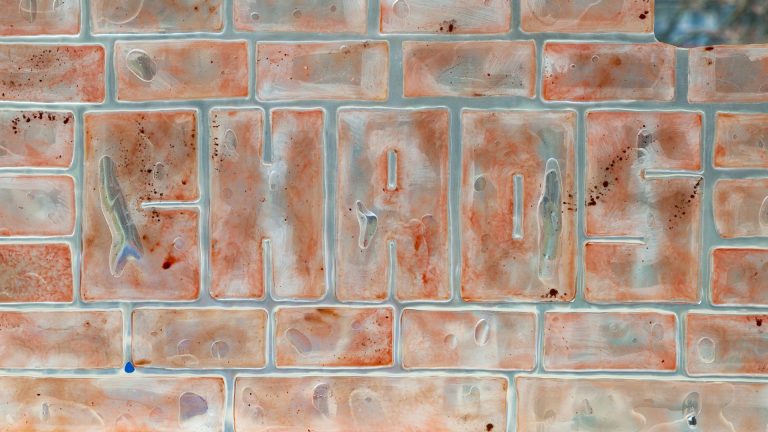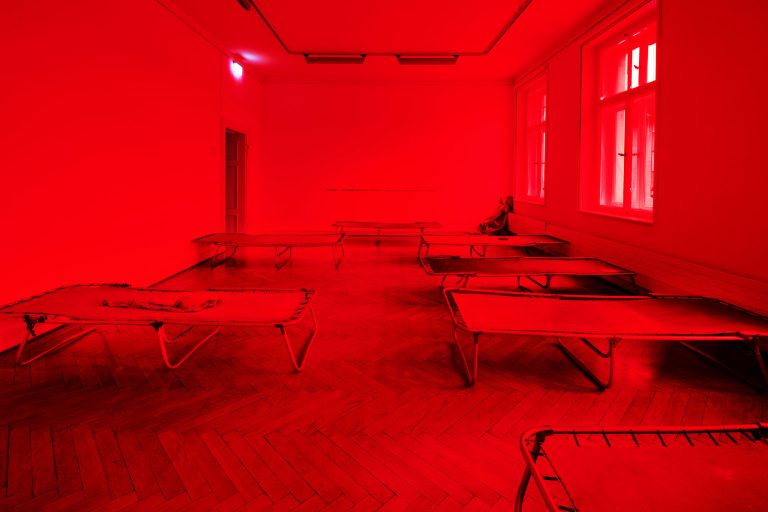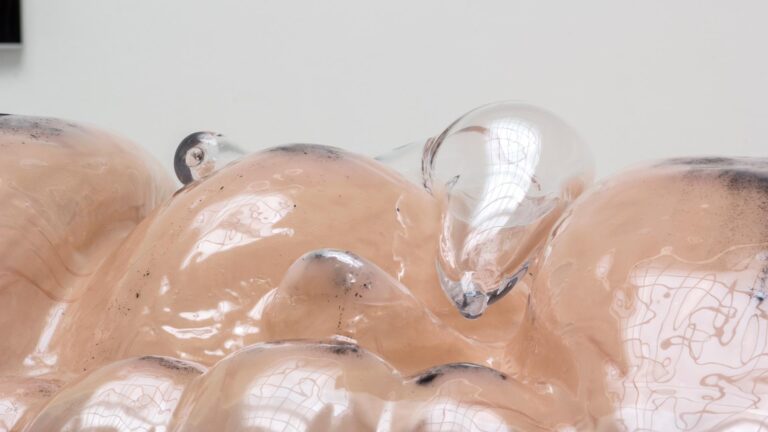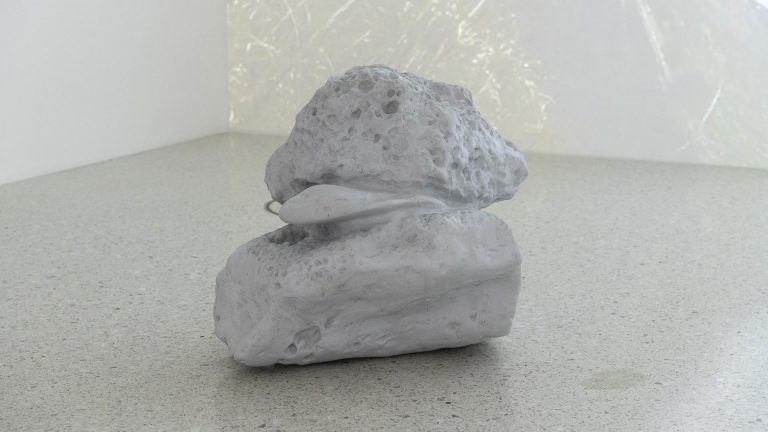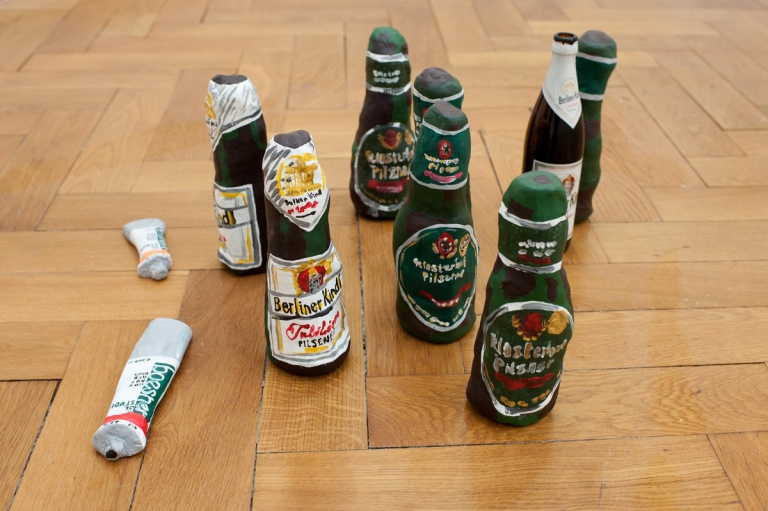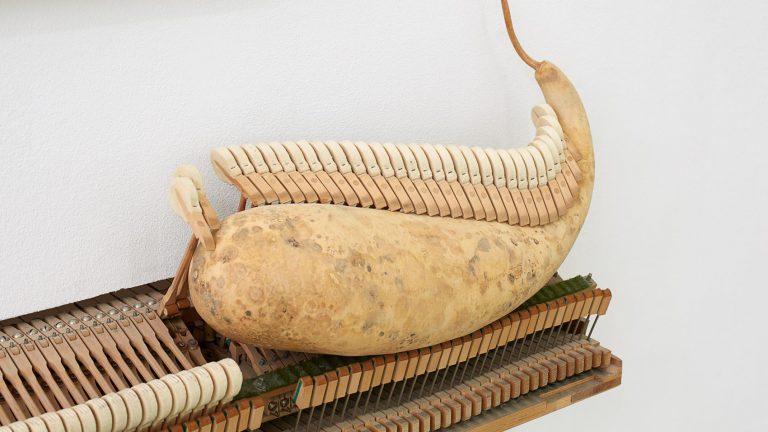Artist: Monilola Olayemi Ilupeju
Exhibition title: Eve of Intuition
Venue: TIER (The Institute for Endotic Research), Berlin, Germany
Date: August 29 – October 13, 2020
Photography: Benjamin Busch/Dokugram. All images copyright and courtesy of the artist and TIER (The Institute for Endotic Research)
Eve of Intuition is a process-oriented exhibition by Nigerian-American artist Monilola Olayemi Ilupeju. During her presence at TIER, she will use the exhibition space as a studio and casual meeting space to explore ideas related to intuition and uncover strategies to disrupt the flow of maintenance of oppressive systems, through interdisciplinary means. The exhibition space becomes a (re)production territory where the separation between the private studio space and the public qualities of the exhibition are blurred.
Within the period of the show the artist will work in correlation to her upcoming performance project at the Deutsches Technikmuseum Berlin, Wayward Dust. This proposal for the museum is part of a larger project developed in collaboration with Decolonize Berlin and Philip Kojo Metz. The project takes up the difficult task of taking down an installation designed by Hans-Jürgen Buchert, a white German sculptor, in the 90’s that rendered an inaccurate representation of the inside of a slave trade cargo ship. The installation was situated within Lifeworld Ship, the Navigation and Shipping Department of the Deutsches Technikmuseum Berlin, with the well-meaning intentions of introducing the history of the Brandenburg-Prussian slave trade and contextualizing the booming shipping economy within the framework of colonialism. The installation contains 82 life-sized figurines placed behind a metal cage, depicting representations of black people in humiliating and inaccurate ways. The installation was open to the public for 17 years and was publicly criticized for the last several years by a diverse set of voices. Yet, it closed officially just under one year ago, after Ilupeju successfully demanded its immediate closure upon the initiation of the project. Instead of elevating the image of the problematic figurines, Ilupeju is working with the dust that has accumulated in the installation for nearly two decades. While performing an act of maintenance by cleaning the dust, she questions the inherited values that shape the historiography promoted by the institution. She introduces a gesture of reproductive labor that has historically been performed by subaltern labor forces, and particularly women, in the promotion and expansion of capitalism. The process of cleaning also recalls Mierle Laderman Ukeles’ 1969 “Manifesto for Maintenance Art”, where she introduced a series of strategies for putting the reproductive labor of women at the center of the space of enunciation. And, as Mark Fisher writes, “Tradition counts for nothing when it is no longer contested and modified. A culture that is merely preserved is no culture at all.”
The main goal of the performance Wayward Dust is to make visible the physical and intangible particles and processes within dust and within the work of reality-building. Dust consists of sloughed off dead skin cells (among other particles like hair, clothing fibers, bacteria, dust mites, bits of dead bugs, soil particles, pollen, and microscopic specks of plastic), which covers the styrofoam figurines. Every time someone experiences the installation, they leave a piece of themselves behind. The dust is a residue that has been created by the visitors, employees, and workers—and many non-human agents—of the museum over the past 17 years. Next to this record of presence, it also represents the shapeshifting temporal nature of colonial practices. She will be using this dust collected at the Deutsches Technikmuseum Berlin as one of the materials to develop her practice.
Leading from this act of maintenance is Eve of Intuition, Ilupeju’s process-oriented exhibition at TIER. Maintenance can be described as the act of causing something to exist or continue without changing. It is a process of preservation, but also of renovation. In socio-political contexts, the maintenance of white supremacy and other discriminatory systems partially depends on the weakening of our senses and collective intuition, exacerbated by an enforced lack of resources. Eve of Intuition is an attempt to recover intuitions and knowledges that have been compromised or corrupted by colonial, biopolitical and social control structures.
Monilola Olayemi Ilupeju is a transdisciplinary Nigerian-American artist and writer living in Berlin. Recurring points of interest in her work include the political processes of perversion, sexuality and intimacy in relation to desire, trauma, and body image, improvisation, intersectional anti-colonial methodologies, queer mechanisms in liberation pursuits, religion and spirituality, and memory, innocence, and the recovery of child selves. Her main concern as an artist, next to the catharsis of creation, is to look at the frayed edges and ruptures of constructed realities and locate spaces where healing, liberation, and (re)generation can take place.
Ilupeju graduated from New York University in 2018 where she studied Studio Art (Honors Studio) and Social and Cultural Analysis, the latter of which focused on the intersections of race and cultural studies, gender and sexuality studies, philosophy, sociology, and political science. The knowledge acquired in these fields continues to inform her practice today. She is also an alumna of the Skowhegan School of Painting and Sculpture, Class of 2018. In addition to her studio practice, Ilupeju has also done extensive curatorial and editorial work with SAVVY Contemporary and Archive Books, among others.
Amid the ongoing coronavirus pandemic, new constraints are present. Our public program has grown from social closeness in the formats of encounters, workshops and interventions. We charted a course not to work with exhibitions, instead emphasizing the relations between art’s productive and reproductive elements.
With respect to everyone’s health, and abiding by current laws, we take a step back and look at exhibitions as the most convenient format at this moment. Exhibitions can be a powerful collective experience, but one of their constitutive powers is the contemplation of the artworks by the viewer, creating individual readings in shared constellations. It seems to be the best moment to use that capacity in times of necessary small gatherings. We welcome the format of the exhibition, which brings with it certain expectations. We look to the domestic sphere, which has become an especially important site of production in recent months, as a model for institutions, which always depend on reproductive labor. The domestic model also has many problematic aspects, such as exploitation and unrecognition of labor and rights. It is perhaps in the tension between its conflicts and possibilities where the power of the domestic lies. It is also where the possible paths for the reorganization of institutions can be uncovered.
Titled Maintenance! Domestics as Institutional Becomings, acknowledging the work of Mierle Laderman Ukeles, our series of solo exhibitions and online events for the next months will address the domestic from different vantage points related to institution-making. We are preparing a reader on the topic that will be launched soon as well. During this new program of exhibitions, the previous interventions will remain at TIER. In that way we’ll keep working on the space as an editorial device to be renegotiated, and an ecology of artworks, underlining its conception as an inner garden based on principles of cultivation.
Hygienic measures: The space of TIER is 100 m² total, allowing for maximum 5 occupants. Up to 2 guests and 3 staff are allowed inside simultaneously. For the events, please register a time to visit to ensure that you can enter the space. We provide hand disinfectant at the entrance. Please keep the minimum distance and wear a mask that covers your mouth and nose.






















